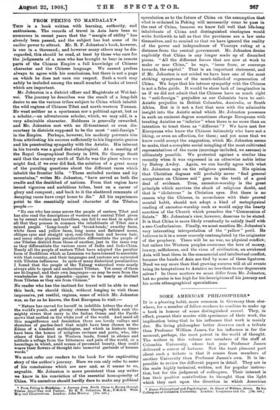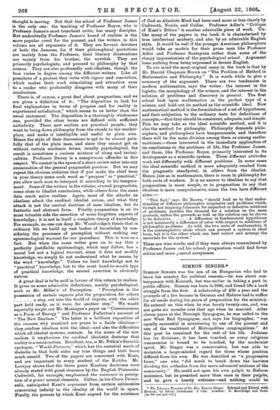SOME AMERICAN PHILOSOPHERS.*
IT is a pleasing habit, more common in Germany than else- where, for a number of fellow-workers to combine to make up a book in honour of some distinguished savant. They, in effect, present their master with specimens of their work, the implication being that to his influence that work is mainly due. No living philosopher better deserves such a tribute than Professor William James, for his influence is for the moment, perhaps, the most potent in the world of thought. The writers in this volume are members of the staff at Columbia University, where last year Professor James delivered a course of lectures. Not the least pleasant part about such a tribute is that it comes from members of another University than Professor James's own. It is im- possible to review the different papers in detail. They are in the main highly technical, written, not for popular instruc- tion, but for the judgment of colleagues. Their interest is less their positive contribution to thought than the light which they cast upon the direction in which American * Essays Philosophical and Psychological: In Honor of William James. By his Colleagues at Columbia University. London Loagmans and Co. [12e. net.]
thought is moving. Not that the school of Professor James is the only one: the teaching of Professor Royce, who is Professor James's most trenchant critic, has many disciples. But undoubtedly Professor James's brand of realism is the more popular creed for the present, and the writers in this volume are all exponents of it. They are fervent devotees of both the Jameses, for if their philosophical quotations are mainly from the Professor, their literary illustrations are mainly from his brother, the novelist. They are primarily psychologists, and proceed to philosophy by that avenue. They are also professedly anti-idealists, though the bias varies in degree among the different writers. Like all preachers of a protest they write with vigour and conviction, which makes their work stimulating and attractive even to a reader who profoundly disagrees with many of their conclusions.
There is, of course, a great deal about pragmatism, and we are given a definition of it : "The disposition to look for final explanations in terms of purpose and for reality in experienced satisfaction," which seems to us better than the usual statement. The disposition is a thoroughly wholesome one, provided the other terms are defined with sufficient catholicity. These new realists are practical people; they want to bring down philosophy from the clouds to the market- place, and make it intelligible and useful to plain men. Hence the style of their discussions is apt to be almost pain- fully that of the plain man, and since they cannot get on without certain academic terms, usually psychological, the result is sometimes a curious mixture of slang and techni- calities. Professor Dewey is a conspicuous offender in this respect. We cannot in the space of a short review enter into any examination of the general pragmatist position. But we may repeat the obvious criticism that if you make the chief term in your theory some such word as " purpose" or " practical," you allow each man to interpret it according to his tempera- ment. Some of the writers in the volume, avowed pragmatists, come close to idealist conclusions, while others from the same data reach naive realism. Again, most of the attacks on idealism admit the cardinal idealist axiom, and what they attack is not the central doctrine of sane idealism, but its fantastic and abstract form. Finally, pragmatism is on its most valuable side the assertion of some forgotten aspects of knowledge; it is not in itself a complete theory of knowledge. For example, no one can deny Mr. Woodbridge's thesis that in ordinary life we build up vast bodies of knowledge by con- sidering the processes of perception without seeking any epistemological warrant for our procedure. This is true as a fact. But when the same writer goes on to say that a perfectly justifiable epistemology, which may follow, has a moral but not a logical warrant, since it does not modify knowledge, we simply do not understand what be means by the word "knowledge." Unless we limit knowledge not to "practical" knowledge, but to the most hand-to-mouth type of practical knowledge, the second assertion is obviously untrue.
A great deal is to be said in favour of this return to realism. It gives us some admirable definitions, mainly psychological, such as Mr. Miller's of Perception. " Perception is the possession of certain aspects plus the preparation for others a step out into the world of objects, with the other part held ready, as it were, for another step." We would especially single out Mr. Montague's paper on " Consciousness as a Form of Energy " and Professor Fullerton's account of " The New Realism." The latter is a brilliant exposition of the reasons why mankind are prone to a facile idealism— they confuse idealism with the ideal—and also the difficulties which all idealist systems contain. In the name of the new realism it emphasises the cardinal idealistic doctrine that reality is a construction. Excellent, too, is Mr. Pitkin's Socratic apologne. "World-Pictures," which has the essential merit of dialectic in that both sides say true things and both leave much unsaid. Two of the papers are concerned with Kant, and are important to every student of the Kritiks. Mr. Lovejoy shows that the three great Kantian doctrines were already stated with great clearness by the English Platonists. Cudworth, for example, emphasised the existence in percep- tion of a priori mental elements. Collier, in his Clovis Univer- salis, anticipated Kant's argument from certain antinomies concerning infinity to the ideality of the world in space. Finally, the process by which Kant argued for the existence
of God as Absolute Mind had been used more or less clearly by Cudworth, Norris, and Collier. Professor Adler's '" Critique of Kant's Ethics" is another admirable piece of work. 'Un- like many of the papers in the book, it is characterised by true intellectual modesty, and also by an admirable English style. It would be well if the younger American philosophers would take as models for their prose men like Professor Adler and Professor Santayana rather than some of the slangy impressionists of the psychological school. Argument loses nothing from being expressed in decent English. .
To our mind the most original essay in the book is that by Mr. Harold Chapman Brown on "The Problem of Method in Mathematics and Philosophy." It is worth while to give a summary of the argument. There are two tendencies in modern mathematics, says the writer : the interest in the logistic, the morphology of the science, and the interest in the solution of problems and discovery in general. The first school look upon mathematics as the perfect type of a science, and hold out its method as the scientific ideal. Now mathematical method is the formulation of a set of hypotheses; and their subjection to the ordinary tests for definitions of concepts,—that they should be consistent, adequate, and simple.
This we may take as the ideal scientific method, and it is also the method for philosophy. Philosophy demands philo- sophers, and philosophers have temperaments, and therefore there will be the same division among them as among mathe- maticians,—those interested in the immediate application of its conclusions to the problems of life, like Professor James, and those, like Professor Royce, primarily interested iu its development as a scientific system. These different attitudes work out differently with different problems. In some cases the ideal scientific method is more adequately reached from the pragmatic standpoint, in others from the idealist. Hence, just as in mathematics, there is room in philosophy for both sorts of workers. It is no answer to idealism to say that pragmatism is more simple, or to pragmatism to say that idealism is more comprehensive, since the two have different aims
" This fact," says Mr. Brown, " should lead us to that under- standing of different philosophic exigencies and problems which, though not inspiring tolerance for imperfect or defective solutions of problems, justifies the demand for a solution on the same grounds, unless the grounds as well as the solution can be shown to be defective A difference in fundamental hypotheseS is not necessarily a difference of value with respect to solutions of philosophic problems. As with the two sorts of mathematics, it is the contemplative alone which can present a system in ideal form, but it is the other which can best collect and arrange the materials for the system."
These are wise words, and if they were always remembered by Professor James And his school, pragmatism would find fewer critics and more ..4eueral acceptance.



































 Previous page
Previous page